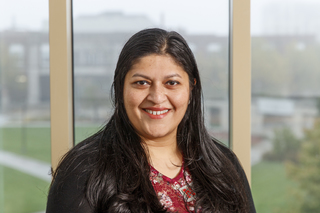
Colloquium: Bhuvana Gopal
Tuesday, Feb. 9
3:30 p.m.
via Zoom: https://unl.zoom.us/j/93418327177
Title: “Peer Instruction in Undergraduate Software Engineering”
Computer science lecturer and Ph.D. student Bhuvana Gopal has published two papers she will present at the FLC on February 9, 2021.
Gopal was advised by Dr. Stephen Cooper. Both papers explored the topic of Peer Instruction (PI), an active learning pedagogy in which students actively participate in the classroom. There have been several research studies regarding the value of PI in computer science.
The first paper, “Peer Instruction in Software Testing and Continuous Integration,” adds to this body of knowledge by examining outcomes from an undergraduate software engineering course with specific focus on the effects of PI on student learning in the topics of unit testing, integration testing, and continuous integration. Results show encouraging increases in levels of success as measured through a cognitive pre- and post-course survey for those topics. This work also documents and hypothesizes reasons for the cognitive gains from PI, as well as student attitudes towards PI.
The second paper, “Peer Instruction in Software Engineering – Findings From Fine Grained Clicker Data,” discusses the results of replicating and modifying a study performed by Zingaro and Porter examining the relationship between fine grained clicker data from in class Peer Instruction and students’ performance in quizzes and exams. The paper reports overall answer correctness when students vote before and after PI discussion, track student response patterns from in-class to the quizzes and exam, and quantify absolute percentages of students that demonstrate longer-term learning from the PI process. The results show that students who learn in class from PI perform well on the quizzes and the final exam, nearly as well as those who understood concepts prior to the classes in which those concepts were taught. Research also found that those who fail to learn from the PI process in class perform worse on quizzes and the final exam. More significantly, research found PI to be an effective way to teach our software engineering course based on student learning before and after PI, a result unique to the study. The results were consistent across the different topics in software engineering in which researchers employed PI.